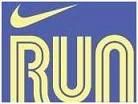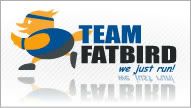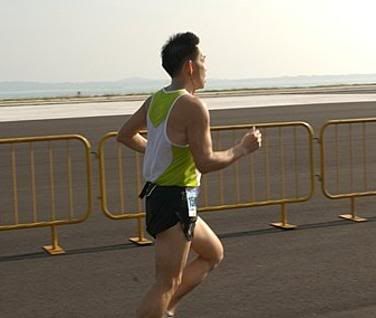Enduring Questions - Can Supplements Cure Your Knee Pain?
-- Extracted From Runners World Magazine --
Thousands of runners pop glucosamine and chondroitin. How much do the pills really help? by: Amby Burfoot
If I had a big wad of bills under my mattress and decided to invest it in something running-related, I wouldn't buy stock in a shoe manufacturer, an energy-bar maker, or even a high-tech GPS company. I wouldn't open my own specialty running store, design a new sock for runners, or organize a Rhythm & Blues Marathon in New Orleans.
Instead, I'd sink all my cash into glucosamine and chondroitin, two over-the-counter supplements reputed to battle osteoarthritis, especially knee pain. According to estimates, worldwide sales of pills containing glucosamine and/or chondroitin could reach $2 billion any day now. It's a safe bet that the recent scare over the COX-2-inhibiting painkillers like Vioxx and Bextra has only accelerated supplement sales.
Runners talk, fuss, and worry about knee pain all the time, and when pain strikes, we often turn to glucosamine/chondroitin. A recent Internet poll at runnersworld.com showed that 94.5 percent of respondents said they had tried one of the supplements. What's more, 79.8 percent reported that their symptoms "somewhat improved" or "greatly improved" after taking glucosamine and/or chondroitin. Less than one percent reported that "things got worse" with the supplements.
In a world that's often 50/50, this amounts to almost miracle proportions. So much so that I'm skeptical. At the same time, I can't help but be impressed by the pile of testimonials on my desk from runners who swear by glucosamine/chondroitin supplements.
It makes you wonder how two innocent-seeming pills could have such dramatic power. Glucosamine and chondroitin both occur naturally in the human body, but most commercial glucosamine comes from the chitin, or exo-skeleton, of shellfish, and most commercial chondroitin from cow or shark cartilage. Both have relatively low rates of absorption from the intestines, and yet both are said to promote healing of the articular cartilage in joints. It's the wearing away of this cartilage that causes the pain and inflammation of osteoarthritis.
Why does knee cartilage wear out? "If I could answer that, I'd have a Nobel Prize in medicine," says Wake Forest osteoarthritis expert Stephen Messier, Ph.D., a nine-time marathoner and six-day-a-week runner. Sometimes, trauma from a football injury, skiing accident, or other mishap can lead to osteoarthritis, but so can overuse of a joint in individuals who are susceptible to such overuse. Messier points out that there are no studies showing that running causes, or doesn't cause, osteoarthritis. The problem: All existing studies are cross-sectional studies. These can only provide a snapshot of a given group of runners at a given time, and can't account for injured runners who might have stopped running prior to the snapshot. It will take a prospective study--a long-running video, rather than a snapshot--to prove or disprove the running-osteoarthritis connection.
Supplemental Studies
The medical literature in support of glucosamine/chondroitin is cautiously positive, though some observers are concerned that many of the studies have been funded by supplement manufacturers. This is particularly true in Europe, where the supplements are big-business prescription medications.
A recent meta-analysis of studies involving glucosamine sulfate and chondroitin sulfate (the most common forms of the supplements) to treat knee osteoarthritis was published in the July 14, 2003, issue of The Archives of Internal Medicine. This paper reviewed the best studies from 1980 to 2002, and concluded: "Our results demonstrated a highly significant efficacy of glucosamine on all outcomes, including joint space narrowing." The paper also found chondroitin "effective" on several outcomes measures, and added, "Safety was excellent for both compounds."
While several other meta-analyses have reached similar conclusions, most experts in the field believe the jury is still out. They're eagerly awaiting the results from the large-sample National Institute of Health's GAIT (Glucosamine/Chondroitin Arthritis Intervention Trial) study, due for publication this fall.
My favorite glucosamine study involved a group of Navy SEALS, and was published in a military medical journal in 1999. The SEALS were younger (average age: 43) and much more active than your typical person with knee osteoarthritis, so I figure they come closer to mimicking the stresses that runners face. Indeed, the study authors noted: "Osteoarthritis is not unexpected in this occupational setting, given the history of high levels of activity and trauma."
The SEALS all suffered from knee osteoarthritis before beginning the double-blind, randomized, 16-week study. Half of them took a supplement containing glucosamine hydrochloride, chondroitin sulfate, and manganese ascorbate; the other half took a placebo. "The relief of knee discomfort was the most important finding of this study," the researchers concluded. "Knee osteoarthritis symptoms were relieved" for the SEALS who took the supplements, an assessment reached both by questioning the patients and by examining their knees.
Among the testimonial e-mails on my desk, the one from Bruce Truax is typical. A self-described "young 53" and a 15- to 25-mile-a-week runner, Truax tore his meniscus three years ago. When his knee pain persisted, his doctor suggested a glucosamine/chondroitin supplement that gradually helped Truax return to pain-free running. "I've been using the supplement ever since," says Truax. "It's great stuff, and I'm a heavy runner at 245 pounds, so I really work the knees hard."
Orthopedic surgeon Robert Erickson, M.D., of Canton, Ohio, has been taking it as a prophylactic for nearly 10 years. "After my first 25,000 miles of running, I figured I needed all the help I could get for my second lap around the world," says Erickson, who has now reached the 50,000-mile mark. "I don't see any downside to glucosamine. It's relatively harmless, especially when you compare it to the Vioxx-like meds." Erickson has concluded that glucosamine is the more effective of the two compounds, a belief shared by many other experts. It's also much cheaper than chondroitin.
Before You Dose Up
Given all the success stories, it would be wrong not to close on a cautionary note. Glucosamine isn't a miracle pill, and it shouldn't be taken by all runners, not even all runners with knee pain. "Running doesn't cause arthritis, but running can aggravate arthritis, and too many runners are running through pain," says Klaud Miller, M.D., an orthopedic sports medicine specialist in Evanston, Illinois, who has knee arthritis himself, from a wrestling injury. "It's just not smart to continue aggravating your knees when they're telling you to stop."
If you have temporary joint pain, by all means try glucosamine or glucosamine and chondroitin. The products are little regulated in the United States, so go with a respected, big-brand company that produces quality products. This way, you're unlikely to have a bad reaction. Be sure to stick with the program for two to three months, as these are slow-acting supplements.
Don't use glucosamine/chondroitin to push through the pain barrier, however. That could lead you down the road to permanent damage. Run sane, not sorry. It's more important to preserve your knees than your running.















0 Comments:
Post a Comment
<< Home